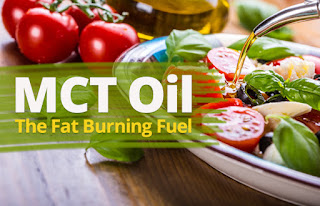If you like following health journals
or you read a lot of articles on how to improve your health then you may have
already encountered MCT oil. But do you really know what it is?
What is MCT oil?
MCT stands for medium-chain
triglycerides, which consist of medium-chain fatty acids. This basically means
that in terms of chemical structure, its fats that make up the strings of
carbon and hydrogen are only “medium” in length. Short-chain fats have less
than six carbons in its strings, while long-chain fats have 13 to 21 –
medium-chain fatty acids are right smack in the middle with 6 to 12 carbons in
its strings.
There are three separate fatty acids
that are identified as MCT. You have C6:0 or Caproic Acid, C8:0 or Caprylic
Acid, and C10:0 or Capric Acid – all of these you can find in coconut oil.
Caproic Acid; while there’s not
enough of it in coconut oil, is known for quickly converting into ketones (the
result of the body burning fat for energy) and not turning into stored fat. C6
tastes bad and usually causes an upset stomach.
Caprylic Acid, a.k.a. Brain Octane is
known for having powerful anti-microbial properties that can help the body
maintain a healthy gut (which is a must in boosting the immune system), and
support mood and mental health. Studies have also proven that Brain Octane is
exceptionally effective in curbing cravings and this is why a lot of weight
management products on the market these days feature C8 in their list of
“super” ingredients.
As for Capric Acid, it’s not as high
performing as Caprylic Acid – it’s definitely slower in terms of converting
into energy, but it’s more affordable than C8.
Benefits of MCTs
- They are used
therapeutically for people with malabsorption problems, like Crohn’s
Disease or a missing bladder.
- They may be
helpful in treating diabetes and hypertension because they support proper
metabolic functioning.
- They will
allow you to increase the amount of carbohydrates you can eat while remaining in
“ketosis.”
Other Sources of MCTs
- Palm kernel
oil
- Full milk
(from grass-fed cows)
- Butter
- Cheddar cheese
- Full-fat
yogurt
How to Incorporate MCTs into Your
Diet
- Use MCT oil,
an egg yolk, extra virgin olive oil, lime extract, and salt for your
homemade mayo to use for sandwiches and salads.
- Use MCT oil
for salad dressings.
- Add some to
smoothies and other healthy drinks.
- Use MCT oil as
replacement for any recipe that asks for coconut oil.
MCT oil can do wonders for your
overall wellness. If you wish to manage your weight, have more energy,
concentrate better, and lower your risk of developing infectious diseases, MCT
oil should definitely figure in your health regimen.
Author Bio: Chelsea Sawyer is a certified health coach. She has been helping many people in changing their behaviors to keep them focused on achieving their health and fitness goals. With great passion for writing, her hobbies include writing and sharing helpful techniques on various health topics. She visits sites like Bulletproof


ليست هناك تعليقات:
إرسال تعليق
We love to hear from you!
Please share your thought here!